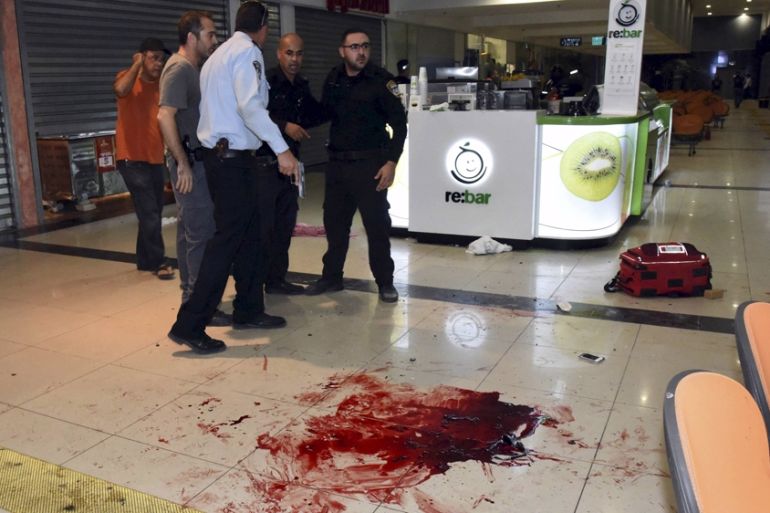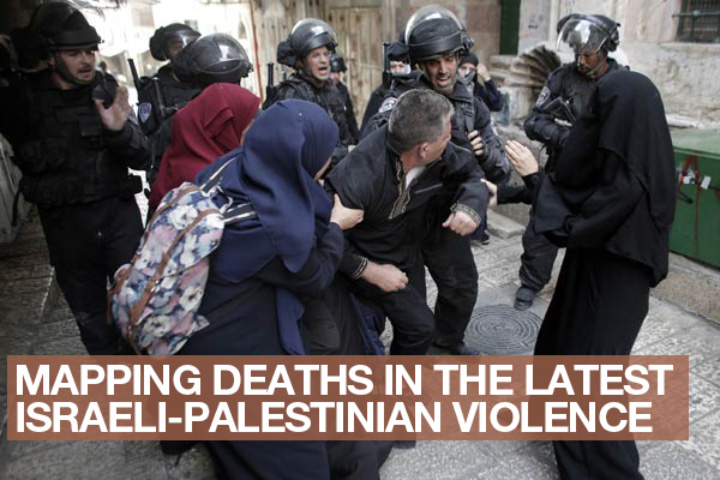Deadly attack hits bus station in southern Israel
Israeli soldier and Eritrean man killed in Beersheba, in attack that also left suspected Palestinian assailant dead.

An Israeli soldier has died of his wounds and at least 11 people, including four soldiers, were injured in an attack on a bus station in southern Israel, police said, describing the incident as a shooting and stabbing attack.
After the attack on Sunday evening, police opened fire on two people at the station in the city of Beersheba, killing an alleged Palestinian attacker. A man of Eritrean origin was mistakenly shot and died later in hospital.
Keep reading
list of 4 itemsRussia-Ukraine war: List of key events, day 792
US secretly sent long-range ATACMS weapons to Ukraine
Russia-Ukraine war: List of key events, day 791
Israeli security forces mistook the Eritrean for an attacker and shot him.
|
|
| Israel to widen police stop-and-frisk powers |
According to the police, the attacker stabbed a soldier and stole his weapon, opening fire on the crowds at the bus terminal. The soldier died at the hospital.
The Israeli IBA network posted footage purportedly recorded by a surveillance camera of the attack.
In other video circulated online, a man – said to be the Eritrean – is seen being kicked by several people as he lay bleeding on the ground. (The graphic footage – which could be disturbing to some viewers – can be found here.)
The suspected attacker was named by police as Muhand Alukabi, 21, a resident of Hura in the Negev.
Hamas, which rules the Gaza Strip, called the attack a “natural response” and Islamic Jihad, another Palestinian group, said it was a “normal answer to Israeli crimes”.
READ MORE: Palestinians clash with Israeli forces across West Bank
Sunday’s attack brings the total number of people killed in the violence that erupted at the beginning of the month to 52: 44 Palestinians and eight Israelis.
The incident comes just a day after five Palestinians were shot dead during alleged stabbing attacks – three of them in Hebron in the occupied West Bank. Palestinians have disputed the police version of events in at least some of the cases.

Triggered by Israeli incursions into the Al-Aqsa Mosque compound last month, violence and protests against Israel’s occupation have increased in frequency across the West Bank, including East Jerusalem, and the Gaza Strip.
Diplomatic moves to halt the more than two weeks of unrelenting violence has gained steam, with US Secretary of State John Kerry saying he plans to meet both the Israeli and Palestinian leaders in the coming days.
Israeli Prime Minister Benjamin Netanyahu, meanwhile, rejected an idea from France that would see international observers sent to the Al-Aqsa Mosque compound.
Israeli forces have responded with a crackdown on protesters, using tear gas, stun grenades, rubber-coated steel bullets and live ammunition.

Checkpoints have been set up in the occupied East Jerusalem, where some of the attackers have come from, and about 300 soldiers on Sunday began reinforcing the police force.
On Sunday afternoon, Palestinians in Hebron marched from a local university to an Israeli settlement, where they were confronted by the army.
Issa Amro, director of the Youth Against Settlements group, said at least 10 Palestinians were arrested.
More protests were held across the West Bank, including the city of Nablus, and in the Gaza Strip.